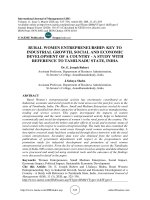Economic growth and economic development 5
Bạn đang xem bản rút gọn của tài liệu. Xem và tải ngay bản đầy đủ của tài liệu tại đây (57.67 KB, 1 trang )
Introduction to Modern Economic Growth
6.9. Taking Stock
6.10. References and Literature
6.11. Exercises
305
306
307
Chapter 7. Review of the Theory of Optimal Control
7.1. Variational Arguments
7.2. The Maximum Principle: A First Look
7.3. Infinite-Horizon Optimal Control
7.4. More on Transversality Conditions
7.5. Discounted Infinite-Horizon Optimal Control
7.6. A First Look at Optimal Growth in Continuous Time
7.7. The q-Theory of Investment
7.8. Taking Stock
7.9. References and Literature
7.10. Exercises
313
314
324
330
342
345
351
352
359
361
363
Part 3.
371
Neoclassical Growth
Chapter 8. The Neoclassical Growth Model
8.1. Preferences, Technology and Demographics
8.2. Characterization of Equilibrium
8.3. Optimal Growth
8.4. Steady-State Equilibrium
8.5. Transitional Dynamics
8.6. Technological Change and the Canonical Neoclassical Model
8.7. Comparative Dynamics
8.8. The Role of Policy
8.9. A Quantitative Evaluation
8.10. Extensions
8.11. Taking Stock
8.12. References and Literature
8.13. Exercises
373
373
378
383
384
387
390
398
400
402
405
406
407
408
Chapter 9. Growth with Overlapping Generations
417
9.1. Problems of Infinity
418
9.2. The Baseline Overlapping Generations Model
421
9.3. The Canonical Overlapping Generations Model
427
9.4. Overaccumulation and Pareto Optimality of Competitive Equilibrium
in the Overlapping Generations Model
429
9.5. Role of Social Security in Capital Accumulation
433
9.6. Overlapping Generations with Impure Altruism
436
9.7. Overlapping Generations with Perpetual Youth
441
9.8. Overlapping Generations in Continuous Time
445
v









